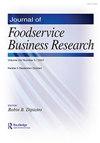新冠疫情期间新西兰对外直接投资消费者的不适和积极性
Q2 Agricultural and Biological Sciences
引用次数: 0
摘要
2020年,在冠状病毒大流行的早期阶段,新西兰的在线送餐服务(OFD)明显受欢迎。新西兰抗击新冠肺炎的方法赢得了全世界的赞誉,在线企业是重要的贡献者,使食品服务业在面临严格限制的情况下保持活力。OFD的研究发现,客户忠诚度的决定因素,如消费者满意度、信任和价值,在很大程度上取决于食品质量、电子服务质量以及与COVID-19传播无关的OFD服务提供商。本研究旨在填补研究空白,并在确认社会人口因素、感知感染风险、感知价值、满意度和信任等既定因素的基础上,研究新的预测因素,如OFD不适和主动的COVID-19策略。偏最小二乘结构方程模型(PLS-SEM)分析显示,年龄是影响主动COVID-19策略的唯一重要社会人口因素。虽然承诺积极应对Covid-19的消费者会对信任和感知价值产生积极影响,但满意度和最终的忠诚度只会受到信任的积极影响。为市场经理和外发服务提供商提供最佳实践建议。《餐饮服务商业研究杂志》版权归Taylor & Francis有限公司所有,未经版权所有者明确书面许可,其内容不得复制或通过电子邮件发送到多个网站或发布到listserv。但是,用户可以打印、下载或通过电子邮件发送文章供个人使用。这可以删节。对副本的准确性不作任何保证。用户应参阅原始出版版本的材料的完整。(版权适用于所有人。)本文章由计算机程序翻译,如有差异,请以英文原文为准。
Discomfort and proactiveness of New Zealand OFD consumers during the coronavirus pandemic
In 2020, during the early stages of the coronavirus pandemic, New Zealand's online food delivery (OFD) services saw a marked increase in popularity. New Zealand had received worldwide praise for their approach to fight Covid-19, and online businesses were important contributors, allowing the food service industry to remain viable in the face of severe restrictions. OFD research has found that the determinants of customer loyalty, such as consumer satisfaction, trust, and value are well established and largely depend on food quality, e-service quality, and OFD-service providers not being associated with COVID-19 transmission. The present study aims to fill a research gap and investigate new predictors such as OFD discomfort and proactive COVID-19 strategies, in addition to confirming well-established ones such as sociodemographic factors, perceived infection risk, perceived value, satisfaction, and trust. The Partial Least Square Structural Equation Modeling (PLS-SEM) analysis reveals that age is the only significant sociodemographic factor influencing pro-active COVID-19 strategies. While trust and perceived value are positively affected by consumers committed to proactively counteract Covid-19;satisfaction and ultimately loyalty, are positively affected by trust only. Best practice recommendations for marketing managers and OFD service providers are presented. [ FROM AUTHOR] Copyright of Journal of Foodservice Business Research is the property of Taylor & Francis Ltd and its content may not be copied or emailed to multiple sites or posted to a listserv without the copyright holder's express written permission. However, users may print, download, or email articles for individual use. This may be abridged. No warranty is given about the accuracy of the copy. Users should refer to the original published version of the material for the full . (Copyright applies to all s.)
求助全文
通过发布文献求助,成功后即可免费获取论文全文。
去求助
来源期刊

Journal of Foodservice Business Research
Agricultural and Biological Sciences-Food Science
CiteScore
4.40
自引率
0.00%
发文量
52
期刊介绍:
The Journal of Forecasting is an international journal that publishes refereed papers on forecasting. It is multidisciplinary, welcoming papers dealing with any aspect of forecasting: theoretical, practical, computational and methodological. A broad interpretation of the topic is taken with approaches from various subject areas, such as statistics, economics, psychology, systems engineering and social sciences, all encouraged. Furthermore, the Journal welcomes a wide diversity of applications in such fields as business, government, technology and the environment.
 求助内容:
求助内容: 应助结果提醒方式:
应助结果提醒方式:


